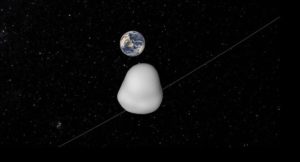by WorldTribune Staff, October 13, 2017
When Asteroid 2012 TC4 buzzed by Earth on Oct. 10, it came twice as close as when it last passed exactly five years before.
The house-sized space rock will also most likely miss the Earth when it returns in 2050. But watch out in 2079.

“We know today that it will also not hit the Earth in the year 2050, but the close flyby in 2050 might deflect the asteroid such that it could hit the Earth in the year 2079,” Rudiger Jehn of the European Space Agency told AFP.
Rudiger placed the odds of an impact 62 years from now at about 1 in 750.
The asteroid zoomed about 26,000 miles (42,000 kilometers) above Antarctica at about 11 percent the distance between Earth and the moon, and just beyond the orbit of geostationary satellites.
Scientists say 2012 TC4 is almost certainly too small to cause any serious concern, even if it did line up Earth in its crosshairs.
“The impact effects would be simply a flash through the atmosphere and a breakup – a very bright fireball, basically,” Paul Chodas, manager of the Center for Near Earth Object Studies at NASA’s Jet Propulsion Laboratory in Pasadena, California, told Space.com.
If 2012 TC4 does attempt to “give us a violent cosmic body blow, it probably won’t be the same kind of existential collision that did in the dinosaurs,” Eric Mack wrote for C-Net on Oct. 12. “In fact, it’s likely smaller than the bolide that exploded when it hit the atmosphere over Russia in 2013, blowing out a bunch of windows in Chelyabinsk in the process.”
Asteroid 2012 TC4 is a space rock that “was never observed until it became a fireball in the sky” in 2012, Mack noted. “All the more reason to point more eyes and lenses toward the sky to find the 99 percent of asteroids in the solar system big enough to level a city that are believed to still be undiscovered.”
Subscribe to Geostrategy-Direct __________ Support Free Press Foundation
